2024届高考英语复习被动语态课件(共25张PPT)
文档属性
| 名称 | 2024届高考英语复习被动语态课件(共25张PPT) |  | |
| 格式 | pptx | ||
| 文件大小 | 864.4KB | ||
| 资源类型 | 教案 | ||
| 版本资源 | 通用版 | ||
| 科目 | 英语 | ||
| 更新时间 | 2023-07-13 15:10:36 | ||
图片预览

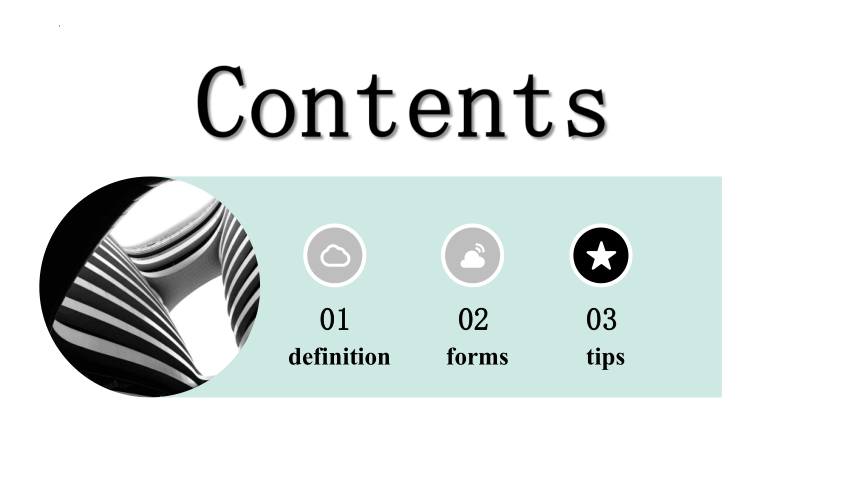
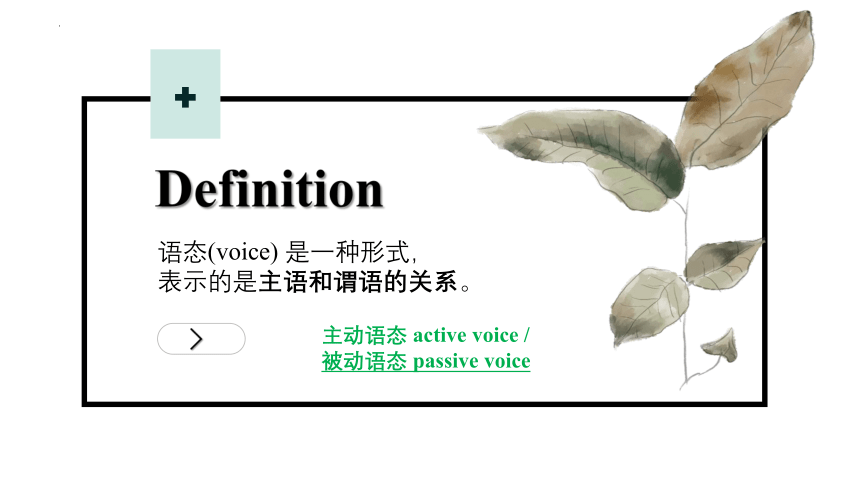
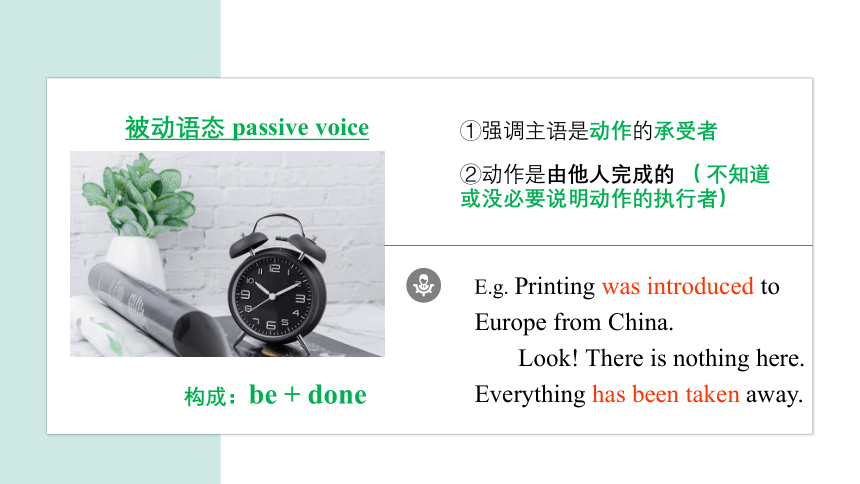
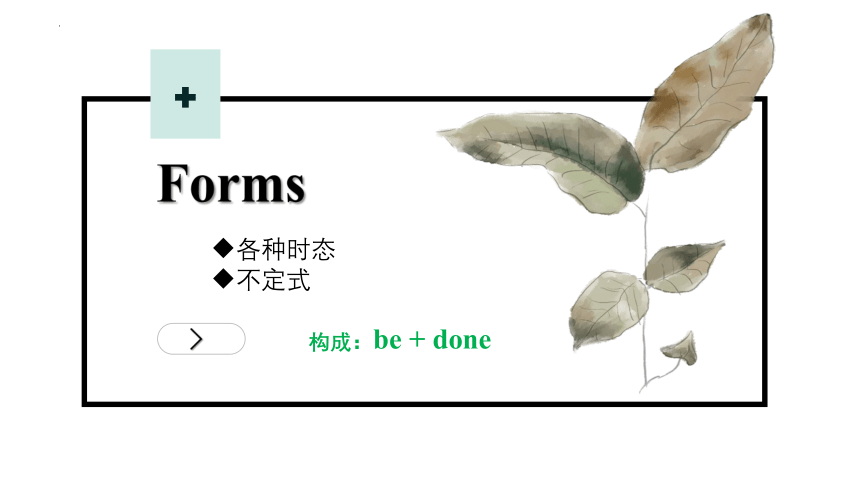

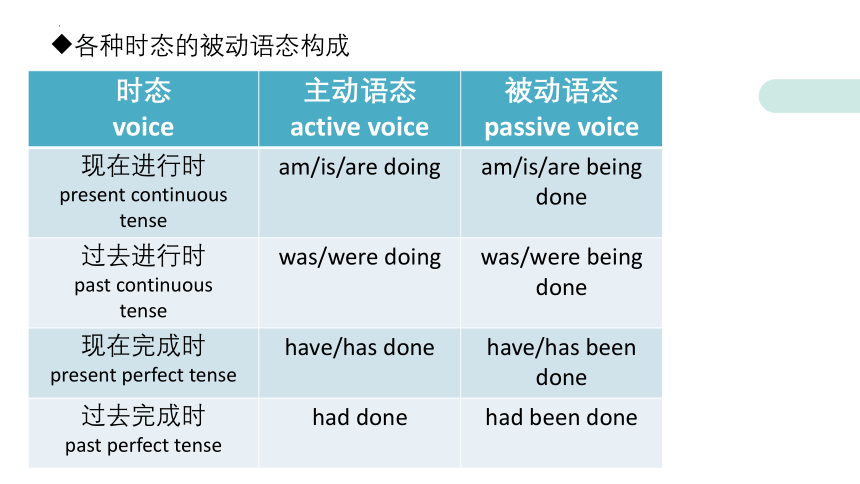
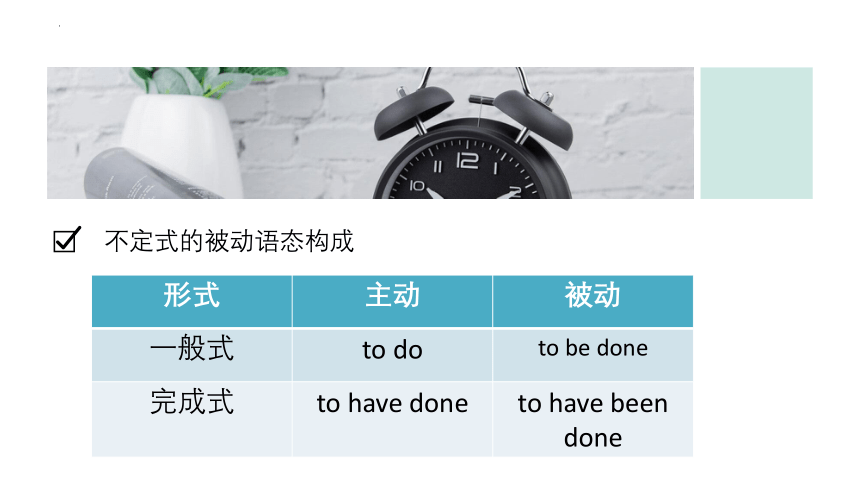
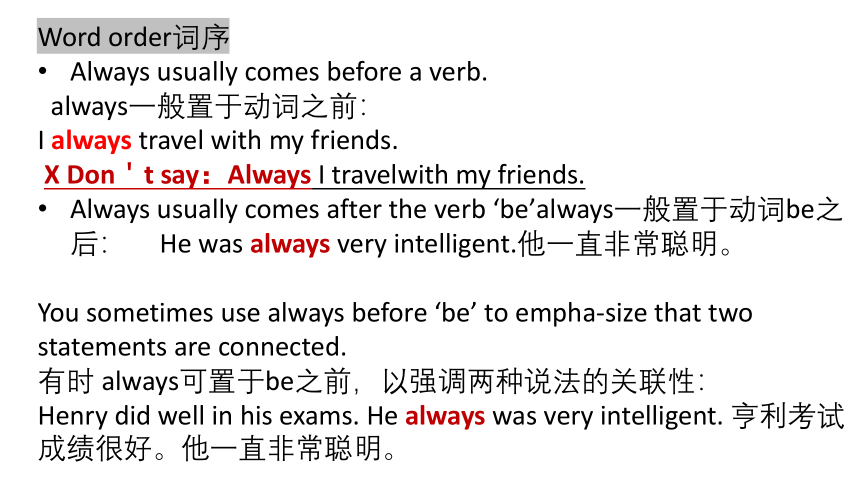
文档简介
(共25张PPT)
>
Unit2 Revise the Passive Voice
Contents
01
definition
02
forms
03
tips
Definition
>
语态(voice) 是一种形式,
表示的是主语和谓语的关系。
主动语态 active voice /
被动语态 passive voice
被动语态 passive voice
①强调主语是动作的承受者
②动作是由他人完成的 ( 不知道或没必要说明动作的执行者)
构成:be + done
E.g. Printing was introduced to Europe from China.
Look! There is nothing here. Everything has been taken away.
>
Forms
构成:be + done
各种时态
不定式
时态 voice 主动语态 active voice 被动语态
passive voice
一般现在时 simple present tense do/does am/is/are done
一般过去时 simple past tense did was/were done
一般将来时 simple future tense will/shall/be going to /be to do will/shall/ be going to/be to be done
情态动词 modal verb 情态动词 + do 情态动词+ be done
各种时态的被动语态构成
时态 voice 主动语态 active voice 被动语态
passive voice
现在进行时 present continuous tense am/is/are doing am/is/are being done
过去进行时 past continuous tense was/were doing was/were being done
现在完成时 present perfect tense have/has done have/has been done
过去完成时 past perfect tense had done had been done
各种时态的被动语态构成
不定式的被动语态构成
形式 主动 被动
一般式 to do to be done
完成式 to have done to have been done
Word order词序
Always usually comes before a verb.
always一般置于动词之前:
I always travel with my friends.
X Don't say:Always I travelwith my friends.
Always usually comes after the verb ‘be’always一般置于动词be之后: He was always very intelligent.他一直非常聪明。
You sometimes use always before ‘be’ to empha-size that two statements are connected.
有时 always可置于be之前,以强调两种说法的关联性:
Henry did well in his exams. He always was very intelligent. 亨利考试成绩很好。他一直非常聪明。
Word order词序
Always usually comes after the auxiliary. always一般置于助动词之后: I have always loved Japan.我一直喜欢日本。
You sometimes use always before an auxiliary to emphasize that two statements are connected. 有时always可置于助动词之前,以强调两种说法的关联性:
I had a great time in Tokyo. I always have loved Japan.
我在东京玩得很开心。我一直喜欢日本。
greatly
adv. formal extremely or
very much【正式】极其,非常:
greatly increased/reduced
The cost of repairs has greatly increased in recent years.
近年来,修理费大幅上涨。
All offers of help will be greatly appreciated.如蒙帮助,感激不尽。
The quality of health care varies greatly.医疗保健服务质量差别极大。
>
Tips
不定式主动表被动用法
不可以用被动语态的情况
其他注意事项
不定式主动表被动用法
He has a family to support.
① 作后置定语
②动宾关系
③主谓关系
I’ll go to the post office. Do you have a letter to be posted
01
动词不定式在名词后作定语,不定式和名词之间的关系是动宾关系,同时又和句中的另一名词和代词构成主谓关系
不定式主动表被动用法
02
在 “...be + adj. + to do ” 的结构中,句子的主语是不定式的逻辑宾语。
That question is difficult to answer.
②动宾关系
类似的形容词有:easy, nice, hard, impossible, important, pleasant, interesting,expensive,
cheap, fit, dangerous...
That kind of water isn’t fit to drink.
不定式主动表被动用法
03
某些动词(如blame,let等)用在be动词后做表语时。
I felt I was to blame.
The house is to let(出租).
04
动词不定式与疑问词连用。
Tom had no idea which book to read first.
05
在“too … to …; enough … to …”结构中。
These boxes are not strong enough to use as a platform.
The problem is too difficult to work out.
不可以用被动语态的情况
1. 某些感官动词加形容词及少数其他的动
词无被动语态。
smell, taste, feel, look, sound, prove等
1) The dish tastes delicious.
2) The theory proved right at last.
不可以用被动语态的情况
The book is so interesting that it sells well.
This kind of cloth washes well. (耐洗)
My pen writes smoothly.
当cut, read, sell, wear, write, wash等作为不及物动词表主语内在的“品质”或“性能”,同时要和well,easily, smoothly, properly这些副词连用。
不可以用被动语态的情况
need + v.-ing 表示“主语承受动词发出的动作”,表示被动意义。
My car needs repairing.
(= to be repaired).
want, require,need,deserve
不可以用被动语态的情况
3. 某些表示状态或者特征的及物动词没有 被动语态形式。这类动词常见的有:
beg, equal, fail, hold, possess, become, contain, cost, fit, have, lack, suit...
This new English-Chinese dictionary
cost me ten dollars.
不可以用被动语态的情况
如:战争爆发了。
The war broke out.
The war was broke out.
4. 通常只有及物动词(组)才有被动语态,
不及物动词没有。
happen, appear, disappear, occur, break out, take place, shut off, turn off, work out
表“发生、关闭、制定”的意思。
其他注意事项
主动句改被动句
We saw him sitting there without doing anything
He was seen sitting there without doing anything
His words made me throw up.
I was made to throw up by his words.
复合宾语
其他注意事项
主动句改被动句
My father is telling me an interesting story now.
I am being told an interesting story by my father now.
An interesting story is being told to me by my father.
双宾
易位后接“to” 的动词:award, bring, hand, lend, mail, offer, owe, pass, pay, post, read, return, send, sell, serve, show, take, teach, tell, throw, write...
易位后接“for” 的动词:book, buy, choose, cook, draw, fetch find, fix, get, make, order, pick, prepare, save, sing, spare...
>
单句语法填空
1.Some of the hotels in my hometown ______________(rebuild)now.
2.The flowers were so lovely that they __________(sell) out in no time.
3.I need at least five stamps before my collection ___________
(complete).
4.He thought it an honour__________________(invite)to the party.
5.George returned after the war, only ___________(tell)that his wife had left him.
are being rebuilt
were sold
is completed
to have been invited
to be told
>
单句语法填空
6.I'm going to Beiing.Do you have anything ___________(take) to your son
7.Whether the wounded man can survive tonight or not remains _______________(observe).
8.The play ______________ (produce)next month aims mainly to reflect the local culture.
9. Many buildings in the city need ____________(repair) ,but the one______________(repair) first is the library.
to be observed
repairing
to be taken
to be produced
to be repaired
>
Unit2 Revise the Passive Voice
Contents
01
definition
02
forms
03
tips
Definition
>
语态(voice) 是一种形式,
表示的是主语和谓语的关系。
主动语态 active voice /
被动语态 passive voice
被动语态 passive voice
①强调主语是动作的承受者
②动作是由他人完成的 ( 不知道或没必要说明动作的执行者)
构成:be + done
E.g. Printing was introduced to Europe from China.
Look! There is nothing here. Everything has been taken away.
>
Forms
构成:be + done
各种时态
不定式
时态 voice 主动语态 active voice 被动语态
passive voice
一般现在时 simple present tense do/does am/is/are done
一般过去时 simple past tense did was/were done
一般将来时 simple future tense will/shall/be going to /be to do will/shall/ be going to/be to be done
情态动词 modal verb 情态动词 + do 情态动词+ be done
各种时态的被动语态构成
时态 voice 主动语态 active voice 被动语态
passive voice
现在进行时 present continuous tense am/is/are doing am/is/are being done
过去进行时 past continuous tense was/were doing was/were being done
现在完成时 present perfect tense have/has done have/has been done
过去完成时 past perfect tense had done had been done
各种时态的被动语态构成
不定式的被动语态构成
形式 主动 被动
一般式 to do to be done
完成式 to have done to have been done
Word order词序
Always usually comes before a verb.
always一般置于动词之前:
I always travel with my friends.
X Don't say:Always I travelwith my friends.
Always usually comes after the verb ‘be’always一般置于动词be之后: He was always very intelligent.他一直非常聪明。
You sometimes use always before ‘be’ to empha-size that two statements are connected.
有时 always可置于be之前,以强调两种说法的关联性:
Henry did well in his exams. He always was very intelligent. 亨利考试成绩很好。他一直非常聪明。
Word order词序
Always usually comes after the auxiliary. always一般置于助动词之后: I have always loved Japan.我一直喜欢日本。
You sometimes use always before an auxiliary to emphasize that two statements are connected. 有时always可置于助动词之前,以强调两种说法的关联性:
I had a great time in Tokyo. I always have loved Japan.
我在东京玩得很开心。我一直喜欢日本。
greatly
adv. formal extremely or
very much【正式】极其,非常:
greatly increased/reduced
The cost of repairs has greatly increased in recent years.
近年来,修理费大幅上涨。
All offers of help will be greatly appreciated.如蒙帮助,感激不尽。
The quality of health care varies greatly.医疗保健服务质量差别极大。
>
Tips
不定式主动表被动用法
不可以用被动语态的情况
其他注意事项
不定式主动表被动用法
He has a family to support.
① 作后置定语
②动宾关系
③主谓关系
I’ll go to the post office. Do you have a letter to be posted
01
动词不定式在名词后作定语,不定式和名词之间的关系是动宾关系,同时又和句中的另一名词和代词构成主谓关系
不定式主动表被动用法
02
在 “...be + adj. + to do ” 的结构中,句子的主语是不定式的逻辑宾语。
That question is difficult to answer.
②动宾关系
类似的形容词有:easy, nice, hard, impossible, important, pleasant, interesting,expensive,
cheap, fit, dangerous...
That kind of water isn’t fit to drink.
不定式主动表被动用法
03
某些动词(如blame,let等)用在be动词后做表语时。
I felt I was to blame.
The house is to let(出租).
04
动词不定式与疑问词连用。
Tom had no idea which book to read first.
05
在“too … to …; enough … to …”结构中。
These boxes are not strong enough to use as a platform.
The problem is too difficult to work out.
不可以用被动语态的情况
1. 某些感官动词加形容词及少数其他的动
词无被动语态。
smell, taste, feel, look, sound, prove等
1) The dish tastes delicious.
2) The theory proved right at last.
不可以用被动语态的情况
The book is so interesting that it sells well.
This kind of cloth washes well. (耐洗)
My pen writes smoothly.
当cut, read, sell, wear, write, wash等作为不及物动词表主语内在的“品质”或“性能”,同时要和well,easily, smoothly, properly这些副词连用。
不可以用被动语态的情况
need + v.-ing 表示“主语承受动词发出的动作”,表示被动意义。
My car needs repairing.
(= to be repaired).
want, require,need,deserve
不可以用被动语态的情况
3. 某些表示状态或者特征的及物动词没有 被动语态形式。这类动词常见的有:
beg, equal, fail, hold, possess, become, contain, cost, fit, have, lack, suit...
This new English-Chinese dictionary
cost me ten dollars.
不可以用被动语态的情况
如:战争爆发了。
The war broke out.
The war was broke out.
4. 通常只有及物动词(组)才有被动语态,
不及物动词没有。
happen, appear, disappear, occur, break out, take place, shut off, turn off, work out
表“发生、关闭、制定”的意思。
其他注意事项
主动句改被动句
We saw him sitting there without doing anything
He was seen sitting there without doing anything
His words made me throw up.
I was made to throw up by his words.
复合宾语
其他注意事项
主动句改被动句
My father is telling me an interesting story now.
I am being told an interesting story by my father now.
An interesting story is being told to me by my father.
双宾
易位后接“to” 的动词:award, bring, hand, lend, mail, offer, owe, pass, pay, post, read, return, send, sell, serve, show, take, teach, tell, throw, write...
易位后接“for” 的动词:book, buy, choose, cook, draw, fetch find, fix, get, make, order, pick, prepare, save, sing, spare...
>
单句语法填空
1.Some of the hotels in my hometown ______________(rebuild)now.
2.The flowers were so lovely that they __________(sell) out in no time.
3.I need at least five stamps before my collection ___________
(complete).
4.He thought it an honour__________________(invite)to the party.
5.George returned after the war, only ___________(tell)that his wife had left him.
are being rebuilt
were sold
is completed
to have been invited
to be told
>
单句语法填空
6.I'm going to Beiing.Do you have anything ___________(take) to your son
7.Whether the wounded man can survive tonight or not remains _______________(observe).
8.The play ______________ (produce)next month aims mainly to reflect the local culture.
9. Many buildings in the city need ____________(repair) ,but the one______________(repair) first is the library.
to be observed
repairing
to be taken
to be produced
to be repaired
